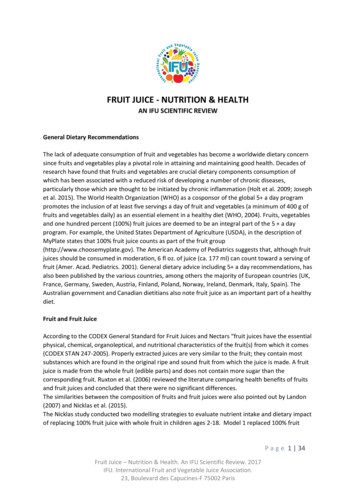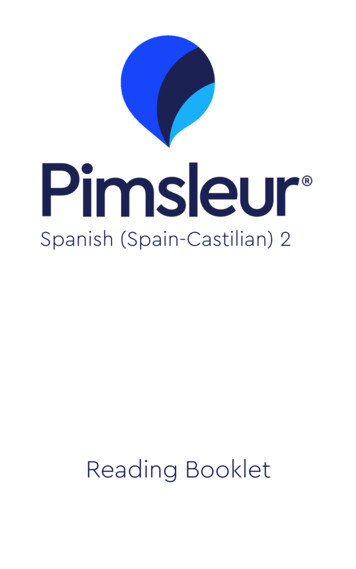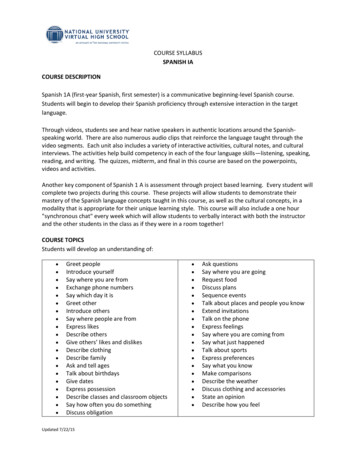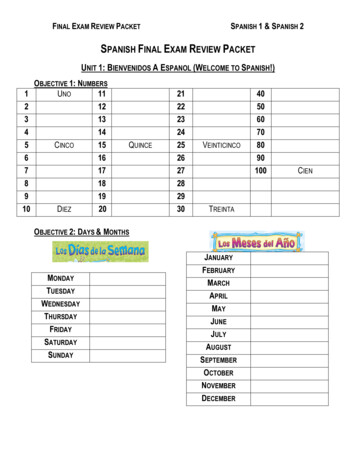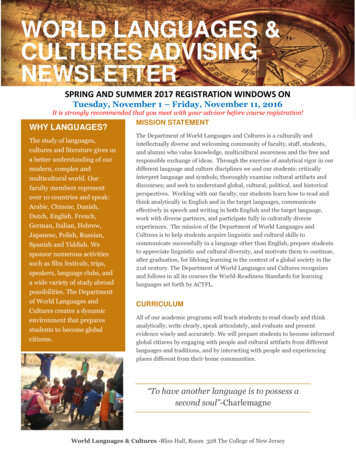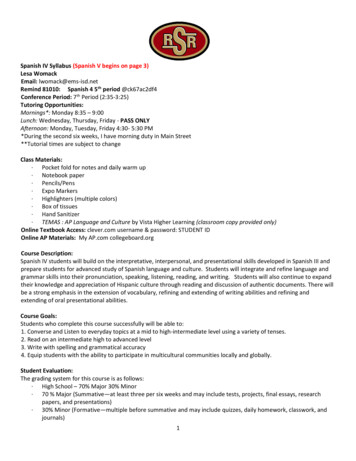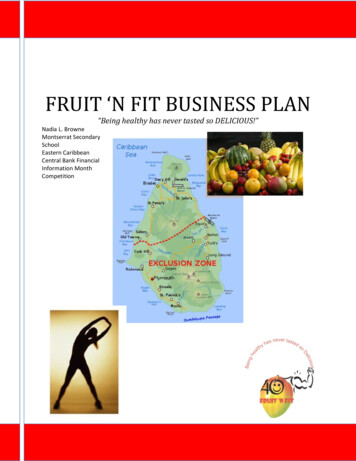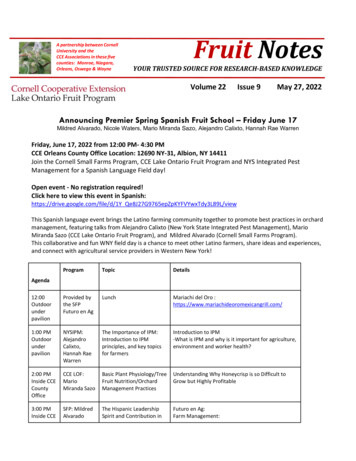
Transcription
A partnership between CornellUniversity and theCCE Associations in these fivecounties: Monroe, Niagara,Orleans, Oswego & WayneFruit NotesYOUR TRUSTED SOURCE FOR RESEARCH-BASED KNOWLEDGEVolume 22Issue 9May 27, 2022Announcing Premier Spring Spanish Fruit School – Friday June 17Mildred Alvarado, Nicole Waters, Mario Miranda Sazo, Alejandro Calixto, Hannah Rae WarrenFriday, June 17, 2022 from 12:00 PM- 4:30 PMCCE Orleans County Office Location: 12690 NY-31, Albion, NY 14411Join the Cornell Small Farms Program, CCE Lake Ontario Fruit Program and NYS Integrated PestManagement for a Spanish Language Field day!Open event - No registration required!Click here to view this event in Spanish:https://drive.google.com/file/d/1Y Qe8J27G9765epZpKYFVYwxTdy3L89L/viewThis Spanish language event brings the Latino farming community together to promote best practices in orchardmanagement, featuring talks from Alejandro Calixto (New York State Integrated Pest Management), MarioMiranda Sazo (CCE Lake Ontario Fruit Program), and Mildred Alvarado (Cornell Small Farms Program).This collaborative and fun WNY field day is a chance to meet other Latino farmers, share ideas and experiences,and connect with agricultural service providers in Western New rovided bythe SFPFuturo en AgLunchMariachi del Oro :https://www.mariachideoromexicangrill.com/1:00 ah RaeWarrenThe Importance of IPM:Introduction to IPMprinciples, and key topicsfor farmersIntroduction to IPM-What is IPM and why is it important for agriculture,environment and worker health?2:00 PMInside CCECountyOfficeCCE LOF:MarioMiranda SazoBasic Plant Physiology/TreeFruit Nutrition/OrchardManagement PracticesUnderstanding Why Honeycrisp is so Difficult toGrow but Highly Profitable3:00 PMInside CCESFP: MildredAlvaradoThe Hispanic LeadershipSpirit and Contribution inFuturo en Ag:Farm Management:Agenda
CountyOfficeWNY Apple Industry4:30 PMProgram CloseRecognizing, Keeping, and Growing Leadership andManagement in the Latino CommunityProgram details:NYS Integrated Pest Management - Agriculture: (https://nysipm.cornell.edu/agriculture/)1:00-2:00 PM, Alejandro CalixtoIntegrated Pest Management (IPM) is a science-based, decision-making process that focuses on sustainableprevention of pests through a combination of biological, cultural, physical and chemical methods, to reduceeconomic, health and environmental risks. The first line of prevention is to know and actively monitor the pestsin your crop to ensure they are maintained under tolerable levels; this is essential to determine what is the besttactic (or combination of tactics) that you should adopt to control that pest.First, know your pests: it’s essential to IPM. If you treat for the wrong pest, you waste time and money, perhapseven your crops . Abiotic problems can mimic pest damage too. Don’t spend money and time on treatments thatdon’t work or may damage your operation.Relying too heavily on just one tactic makes for adaptable pests. Pests can become resistant to pesticides. Thebattle against pests costs money — which you should weigh against what you might lose from a pest. Thebalance point, or threshold, varies from situation to situation. This is where scouting, a cornerstone of IPM, kicksin. Meanwhile, maintaining tolerable levels of pests helps keep their natural enemies — the insects or diseasesthat prey on them — on location and working for you.CCE Lake Ontario Fruit Program – Tree Fruit Production:2:00-3:00 PM, Mario Miranda SazoThis year practical technical knowledge of Honeycrisp among Hispanic orchard workers in Western NY needs tocontinue and be expanded. The CCE LOF Spanish Fruit Program has identified this as a key area for educationalprogramming and collaboration with the Cornell Small Farms Program and NYS IPM.There is a great need in the WNY apple industry to improve tree growth and reduce occurrence of bitter pit inHoneycrisp trees which require constant support, care, and labor provided by a well-trained, primarily Spanishspeaking labor force. During the June 17 event, participants will gain a deeper understanding of the importanceof crop load management and tree fruit nutrition, both critical aspects in business success for Honeycrispcultivars and much more.Cornell Small Farms - Futuro en Ag Project: :00-4:30 PM, Mildred AlvaradoWhile this portion of the field day will promote maintaining a broad perspective when facing decisions toachieve personal and professional goals as farm business managers and owners, the Futuro en Ag projectfocuses on producing educational programs and resources for new and beginning farmers and future agentrepreneurs. Check out the latest educational resource offerings in Spanish by visiting SFP’s Centro deRecursos para Fincas (https://smallfarms.cornell.edu/recursos/)The Hispanic Leadership Spirit and Contribution in WNY Apple Industry
Year to year, New York State harvests more than 1.2 billion pounds of apples, cares for more than 1.6 millionapple trees, and farms more than 55,000 acres that provide fresh, nutritious apples to more than 68 millionpeople around the country. (New York Apples Association, 2022). A huge portion of this effort is due tothe massive contribution of Latino farmers, employees, and service providers who actively grow, harvest, pack,market, distribute, and export world-famous, NYS grown apples. Recognizing our contributions as Latinofarmers, our leadership, our skills, and our role in the agricultural sector will create opportunities to envision anddevelop successful agricultural careers. Additionally, understanding our contributions help us identify uniqueskills, as well as professional and business goals, which in turn improve our well-being and family lives, whileinspiring our entire Latino agricultural community.Together, we will explore and learn sustainable management practices from our local Latino community offarmers, managers, supervisors, farm owners, crew leaders, and employees in Western New York. As acommunity, we possess the skills to sustainably manage human, financialand natural resources. Sharing this knowledge and experience is key tocontinuing to grow leadership and business ownership in the appleindustry.Welcome Natalie Mrzywka to Our Team!Natalie Mrzywka & Craig KahlkeSome of you may know by now that are longtime AdministrativeAssistant, Kim Hazel, resigned from CCE effective May 9. We arefortunate that we will not miss a beat as she’s been replaced by NatalieMrzywka. Natalie was raised in Holley NY on a small family farm. Theyraised market lambs and showed Boer goats along with showing horsesthat she’s done her whole life. Natalie also grew up in the Orleans County4-H programs. She currently still has her own small farm in Albion. Shestarted with CCE back the summer of 2016 as a summer assistant in the4-H office. She did this for 2 years and then came back in January of 2020as the 4-H administrative assistant. Natalie has been a friendly face and hard worker in the Orleans CCE officeever since!! Please welcome Natalie to the team when you see her or talk to her on the phone!Welcome Jennifer Duerden to Our Team!Craig Kahlke & Jennifer DuerdenLOF has hired some help for the growing season! On May 24, Jen Duerdenstarted with our team. She’ll continue full-time with us through harvest,until October 28. Jen comes to us with a master’s degree in Food Studiesfrom Chatham University in Pittsburgh. She is originally from Florida,growing up in a commercial fishing family on the west coast. She also hasexperience as a fabricating assistant for many artists and projects. Jen willbe working with us on a number of funded projects, along with learningthe duties of the extension team. Please welcome Jen when you see her!
Announcing the 2022 Virtual Orchard Meetup Summer SeriesOrchard Efficiency: Labor and TechnologyFirst Meetup is Next Thursday June 2, 7pm ESTMario Miranda Sazo (CCE LOF), Kristy Grigg-McGuffin (OMAFRA), Bernardita Sallato (WSU), Anna Wallis(MSU), and Daniel Weber (PSU)Please join us for a second season of Virtual Orchard Meetups in June-July 2022. In 2021, we launched theHoneycrisp Virtual Meetups, a series of four webinars connecting industry members across North America,which included over 20 specialists and 1000 participants. Based on the overwhelmingly positive feedback, wewill be offering a second season in 2022.This year’s theme will be Orchard Efficiency: Labor and Technology. Webinars will showcase growers and otherspecialists leading the development of these aspects of the industry. We will hear about their experiencesmanaging the current challenges and participating in novel solutions.Webinars will be conducted live on Thursdays at 4:00pm (PST)/7:00pm (EST), on June 2, 16, 30, and July 14.The format will be an open discussion and in a very inclusive virtual format. Each webinar will last 90 minutes.The program is free of charge.Register Here: https://msu.zoom.us/webinar/register/WN lbvRIOYcR52A Nfw03Z qQ June 2 Labor – Grower Experiences June 16 Labor – Specialist Panel June 30 Technology – Grower Experiences July 14 Technology – Specialist PanelThis extension effort is being conducted across North America in close collaboration with the International FruitTree Association (IFTA) (https://www.ifruittree.org/), the AI Institute for Transforming Workforce & DecisionSupport (https://agaid.org/) and Cornell Institute for Digital Agriculture ther you are a fruit grower with ample experience in labor and technology, one that has modest experience,or one that is just getting started, the Virtual Orchard Meetups will be the right setting for you to ask questionsand find the right technical information based on the most recent science and experiences.Agricultural Supervisory Leadership Certificate ProgramDr. Rich Stup, Cornell UniversityCornell Agricultural Workforce Development: (https://agworkforce.cals.cornell.edu/)has opened registration for the Managing Performance course offered by the Agricultural SupervisoryLeadership Certificate program: uing education credits are now offered for this course!
Understand motivation. Harness the power of performance feedback and coaching. Build clear and effectiveworkplace communications. Set safety expectations. Conduct effective performance improvements. 275 per personMaterials release June 17, 2022 and live weekly Zoom discussions will be held from 11 AM to noon EST eachThursday from June 23 through July 28. Participation in the live sessions is highly encouraged and provides avalued opportunity for peer to peer learning and networking.Register 5dcbe67d5de9?locale en-USSupervisors are critical to the success of farm businesses. They have a major impact both on employees’ dailywork experiences and on the production performance of the business. The Agricultural Supervisory Leadershipcertificate helps farm supervisors and managers learn and apply human resource management practices andleadership skills that foster rewarding workplaces and drive business results. Confident managers whothoughtfully apply leadership and management skills improve employee performance, develop teams, reduceemployee turnover, and increase employee engagement. The courses within the certificate program will offerextensive practice and engagement activities to build confidence and skill sets.Other courses in the Agricultural Supervisory Leadership certificate include:Transitioning to Supervisor: Develop essential communication skills and manage conflict. Lead amulti-cultural team. Build an effective workplace culture. Organizing Work for High Quality Results: Develop clear expectations and standard operatingprocedures. Delegate effectively. Diagnose and correct performance problems. Managing Performance: Understand motivation. Harness the power of performance feedbackand coaching. Build clear and effective workplace communications. Set safety expectations.Conduct effective performance improvements. Ethics and Employment Regulations for Supervisors: Implement responsible and ethical laborpractices and understand why this matters for agriculture. Recognize and prevent sexualharassment. Understand and follow minimum wage and overtime laws. Implement EqualEmployment Opportunity laws to prevent discrimination and harassment. Use an employeehandbook. Handle employee discipline and termination. Employee Development and Training: Identify training needs. Understand learning styles. Designand plan learning experiences that accommodate learner needs. Develop effective training skillsand techniques. Evaluate learning results and training effectiveness. Staffing and Organizing Your Team: Develop job descriptions. Learn how to find potentialemployees, interview and select the right people. Implement new hire documentation,employment authorization, and onboarding: bringing new employees into the business successfully and productively.
More InformationEach course includes up to six weeks of instruction on topics that will build your leadership and managementskills. Instruction includes a combination of prerecorded lectures, reading assignments, written exercises, livediscussion sessions and quizzes. For those looking to learn more on a particular topic, supplemental videos andarticles may be recommended by the instructor. To get the most out of the course, students should plan tospend two to four hours each week on combined course activities. Courses can be taken in any order.For questions, contact Rachel McCarthy, Supervisory Leadership Certificate Program Coordinator,at rachel.mccarthy@cornell.edu.Resurgence of Spongy Moths (previously called gypsy moths) in New YorkAnya Osatuke, CCE Western NY Berry Extension SpecialistLast year, numerous blueberry, strawberry, and low-input apple fields were set back by spongy mothcaterpillars. Spongy moths, or Lymantria dispar, previously known as gypsy moths, are an invasive pest in theUnited States. Right now, tiny, black, fuzzy caterpillars are drifting down from trees on little threads of webbing.You might notice them landing on you if you are out in the field, especially near a tree line.At this early life stage, we recommend spraying DiPel BtK (Active ingredient Bacillus thuringiensis subspecieskurstaki), or DiPel aizawai (active ingredient Bacillus thuringiensis subspecies aizawai) to control the caterpillars.When applied to leaves, the bacteria in DiPel create a protein that crystalizes in the digestive tract of the larvae,eventually killing them. Thus, the larvae need to eat leaves that are coated with DiPel for the pesticide to takeeffect.As larvae get older, in another week or two, their digestive systems become more robust. By the time you cansee colorful splotches on the spongy moth larvae, eating DiPel-covered leaves is more likely to slow them downthan to kill them.Spongy moths typically have only one generation a year. Their larvae overwinter in spongy-looking egg masseson tree bark and other rough textured structures. While spongy moths have lived in the United States for over100 years, their populations can only become noticeable in certain years.The hot, dry weather we had early last summer let massive numbers of caterpillars grow into adults and mate.By the time we had constant rains in July last year, the next generation was safely tucked away into egg masses.Now that we are having another hot, dry spring, the spongy moths are emerging again and they are feelingwonderful. Hopefully, the rain we’ve had in the past week and again in the forecast will slow the caterpillarsdown, but I'd recommend having some DiPel available if the populations persist past this week.Wanted: Woolly Apple AphidsThe Apple Rootstock Breeding Program in Geneva, NY is collaborating with a network of U.S. scientists to collectand DNA fingerprint Woolly Apple Aphids (WAAs) throughout the U.S.A. We need to collect material all over thestate of New York. If you see WAAs on your farm can you please send a quick email to Gennaro Fazio atgf35@cornell.edu ? Our intention is to come and collect some and preserve it for DNA extraction. Thank you
Mark Your CalendarMeeting Title2022 Virtual Orchard Meetup Summer SeriesOrchard Efficiency: Labor and TechnologyDateFirst meetup (grower experiences from the entire US) is next Thursday June 2.Three additional meetups are scheduled on June 16, 30, and July 14Time7:00-8:30pm ESTLocationMeeting via ZoomRegister Here: https://msu.zoom.us/webinar/register/WN lbvRIOYcR52A Nfw03Z qQCostFreeContact for Info/RegistrationMario Miranda Sazo (cell 315-719-1318; mrm67@cornell.edu)Brief description of MeetingWebinars will showcase growers and other specialists leading the development of theseaspects of the industry. We will hear about their experiences managing the current challengesand participating in novel solutions.Meeting TitlePremier Spring Spanish Fruit SchoolDateFriday, June 17Time12:00-4:30pmLocationCCE Orleans County Office, 12690 NY-31, Albion, NY 14411 (pavilion and indoor class)CostFree, no registration requiredContact for Info/RegistrationMario Miranda Sazo (cell 315-719-1318; mrm67@cornell.edu)Brief description of MeetingThis event will feature talks from Alejandro Calixto (New York State Integrated PestManagement), Mario Miranda Sazo (CCE Lake Ontario Fruit Program), and Mildred Alvarado(Cornell Small Farms Program).Meeting TitleDateTimeLocationCostContact for Info/Registration2022 LOF Summer TourTuesday, August 9thAll dayOrleans CountyFree, thanks to our sponsorsPreregistration required for lunch counts:https://lof.cce.cornell.edu/event preregistration new.php?id 1669Brief Description ofMeetingConfirmed Farms: Fish Creek Orchards, LLC, Kast Farms Inc., Orchard Dale Fruit Farms and NesbittFruit Farms. Topics: Precision Crop Load Management ( including the use of new technologies,bloom thinning results, and pruning severity results), Pneumatic Pruners, Herbicide Trial Results,and Pest & Disease Management.
Cornell Cooperative ExtensionLake Ontario Fruit Program12690 Rt. 31Albion, NY 14411ContentsAnnouncing Premier Spring Spanish FruitSchoolAnnouncing the 2022 Virtual OrchardMeetup Summer Series Orchard Efficiency:Labor and TechnologyAgricultural SupervisoryLeadership CertificateProgramResurgence of Spongy Moths(previously called gypsymoths) in New YorkWanted: Wooly Apple AphidsMark Your Calendar
YOUR TRUSTED SOURCE FOR RESEARCH-BASED KNOWLEDGE . Volume 22 Issue 9 May 27, 2022 . . 12690 NY-31, Albion, NY 14411 . Join the Cornell Small Farms Program, CCE Lake Ontario Fruit Program and NYS Integrated Pest Management for a Spanish Language Field day! Open event - No registration required! . Basic Plant Physiology/Tree Fruit Nutrition .
